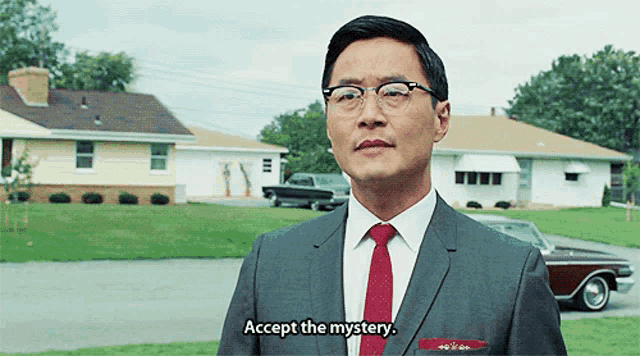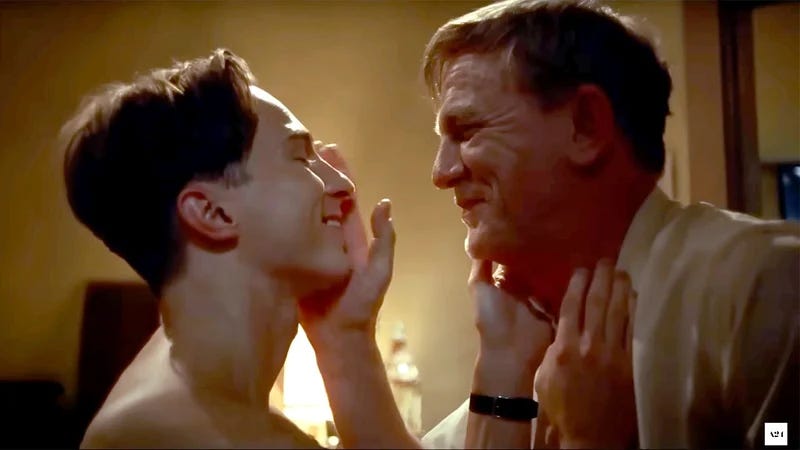Volume 5, Issue 50: The Telltale Moozadell
"The amazing thing about snakes is that they reproduce spontaneously."
Here is a button where you can subscribe to this newsletter now, if you have not previously done so. I do hope that you enjoy it.
The next two newsletters after this one, as always, are the year-enders: My top 10 movies of the year—which will first be announced on the Grierson & Leitch “Dorkfest” podcast this Wednesday—and then the yearly wrapup newsletter with links to everything I wrote in 2024. (Here’s 2023’s version.) So this is the final “official” newsletter of 2024. As if anything involving this newsletter could ever be classified as “official.”
About 18 months ago, I returned to Champaign, Illinois, to talk to journalism students at the University of Illinois, ostensibly to give back to the school that taught me the foundations of my profession but, much more important, as an excuse to go to an Illini basketball game. I sat in a fancy box for the game—I got to meet Kenny Battle!—and before tipoff, while I was pouring myself a glass of funded-by-your-public-education-dollars bourbon, I turned to my left and ran into, of all people, Timothy Killeen, the president of the University since 2015. He shook my hand and thanked me for returning, and I told him I was honored to meet him and that I was appreciative of all the fine work he had done, and continues to do, for my beloved alma mater.
He smiled, thanked me again and then asked me a question I’ve been a little obsessed with ever since.
“You were talking to the College of Media today, yes?” he said in his charming Welsh accent. I told him I was.
“So I have to ask,” he said, “what do you even tell those kids?”
This is, I’ll confess, not necessarily the most reassuring question to be asked by the man who is in charge of the University whose media department you have flown into town to support, and I was a bit taken aback by it. I think I mumbled something about “well, it’s a profession that encourages entrepreneurship!” and he gave me a grin and a pat on the back and then went off to talk to people presumably far better positioned to support the University’s long-term financial goals than I am.
But his question has stuck with me. It’s one, in the 18 months since he asked it, has only become more urgent. The media business has contracted even more dramatically since March 2023, under siege, threats coming from all directions: Widespread distrust, wobbly or openly venal corporate ownership, AI slop and an incoming Presidential administration that openly declares journalists “enemies of the people.” The media industry spent an entire election cycle trying to tell the American public the truth about the dangers of electing Donald Trump, and that American public responded by giving Trump more votes than he’d ever received before, returning him to the reins of power and pretty much rejecting every word we said—not exactly the sort of ringing endorsement that makes you think all this work you’re producing is having much impact or lasting resonance. It’s a perilous gig: You don’t get paid a lot, you have to switch jobs constantly, hardly anyone listens to you, even fewer trust you, and, oh yeah, if you are somehow able to cobble together a stable, respected career that allows you enough of a salary to provide for your loved ones, you’re in constant danger of getting dropped at any second so that they can give more money to a sleeveless man whose primary talent is farting in a microphone. It’s a profession with countless indignities, zero stability and a public approval rating that is literally lower than criminals.
So: What do you tell those kids? Why should they do this? Why do I do this?
As we approach the end of an extremely difficult year for anyone who works in professional media, on the eve of one that may be even worse, it’s a question worth trying to come up with real answers to. So allow me to try. Here, President Killeen, is what I would tell them, if I get a chance again.
It’s never, ever boring. It is not difficult to understand, in an age where tuitions are at all-time highs—journalism tuition at the University of Illinois is literally four times what it was when I went there—why any parent (or student taking out a massive loan) would be wary of investing a large chunk of their life savings to study a field lacking even the slightest bit of stability or linear career advancement. Parents, more than anything else, want not to worry about their kids (and also want not to pay for them the rest of their lives), and having your child setting out on a media career certainly counts as something to worry about. Lord knows my parents were pretty concerned when their son was 28 years old, living in one of the most expensive cities in the world, answering phones in a doctor’s office for 12 bucks an hour and writing for a bunch of websites that no one read and no one was paying him for. It would have been much easier for their mental states had I worked at a bank or a hedge fund, slowly crawling my way up the chain. They’d certainly have been worried about me less.
But I would have been miserable—and one of the primary reasons my parents didn’t try to talk me out of staying in media was because they knew it. Parenting is knowing your kids, and understanding that what they want for themselves is more important than what might be personally convenient for you. I mean, I want my kids to have fulfilling lives, right? Sure, I want their lives to be stable. But more than that: I want their lives to be interesting. I don’t want my kids to be bored! When you work in media, you are constantly doing new things, meeting new people, learning about the world, being introduced to concepts and viewpoints you would have never encountered otherwise. You’re not just sitting in a sad office with dim lighting, moving numbers around for some rich guy you’ll never meet and who doesn’t give a shit about you. You get to do things. It’s not always easy. It’s not always fun. But it’s never dull. If it’s something you’re dedicated to doing, nothing else will ever seem worthwhile.
You get to all sort of places and meet all sorts of amazing people. Seriously, I’ve been to Russia! I’ve sat and talked with Spike Lee for hours. The first person I told that I was going to be a parent, even before my parents, was Carmelo Anthony. I got to talk about my writing in Montana at night after climbing a mountain that day. I’ve met writers and artists and editors and some of the most brilliant people who live on this planet—solely because I work in media. I am a small town kid from rural Illinois, and I’ve been able to see more of the world and its people than I ever could have possibly imagined. To work in media is to give yourself over to curiosity, and that curiosity can take you anywhere.
The skills you learn matter everywhere. To work in media is to learn basic skills of:
Information gathering.
Clear and concise communication.
Critical thinking.
Consistent and perpetual productivity.
Entrepreneurialism and self-sustainability.
Public presentation.
The humility that comes with handling criticism and having your work dissected in the public square. (Hopefully. I’ll say not everybody’s great at this one.)
Flexibility in career options and possibilities.
Frugality.
Maybe these kids won’t end up working the same job for the next 40 years. Maybe they don’t end up working a media job at all. But all those skills are going to come in handy for whatever they do—whatever any of us do.
People really do want this stuff. This was a smart take on the world of Internet content we live in.

Whether you agree with that or not—and Margaret Sullivan noted the problem of journalism itself starting to become a luxury item—the one thing everyone has in common is that they want information. People want to know stuff! Information, and perspective, they are valuable goods that will forever be in demand. This is partly because people want to be informed of what’s happening around them. But I think it’s just as much because people just don’t want to feel alone. The most satisfying emails I get in response to my work are not “wow, Will, that was great, you’re great.” They’re instead when someone has read something that reminded them of something about themselves, sparked a memory, made them think about their own life and their own story a little differently, in a way they then feel compelled to share. What you are doing when you work in media is sharing yourself—your information, your view on the world, your perspective—with someone else, and inviting them to do the same. People want to do that. All people. And they always will.
The industry has changed dramatically and will do so again. When I told my father that I wanted to major in journalism, he said, immediately, “but how will you find a job?” This was more than 30 years ago. The industry itself has turned upside down in a million ways since then—the basic career track they taught us at Illinois in the ‘90s was “get a job at a suburban Chicago newspaper, climb your way up to a Tribune job when maybe you’re 40 and then work there until you die”—and it will continue to do so. I’ve been doing this long enough to be suspicious of any and all trends. Fifteen years ago everything was blogs; 10 years ago everything was Buzzfeed listy crap and slideshows; five years ago everyone was pivoting to video; today it’s all podcasts. There will be something different in five years, and then five years after that. The only constant thread I’ve seen in this business has been everyone declaring its doom. It has been happening my entire life. And yet here it still is. Anyone who says they know where this is all going to trying to sell you something. Accept the mystery.
We need you. Just because journalism’s warnings went unheeded this year, just because it’s harder to get less engaged people to listen to basic foundational truths right now, that doesn’t mean it’s not still vitally important work to do. Eventually the bullshit is going to fade. It always does. To document real truth, with humility and awareness of our own frailty, is a vital public service. I once argued against public follower numbers on social media accounts because you should always write or say things the same if you have 30 million followers as if you had 30,000, or 30, or zero. The same goes for truth. You have to keep saying it, and sticking to it, whether everyone’s listening or not. Even if people insist on rejecting it. Especially if they do.
You only get to live once. One of the most difficult parts of getting older is to see the bitterness set in, to see people (or be one of those people) who once had high hopes and dreams but who settled for something less, often for noble and understandable reasons, come to terms with the fact that their lives did not turn out the way they wanted them to. This is what aging is, of course—having regrets and, hopefully, learning to live with them. However your life turns out, you’ll never regret having tried something, having following your most idealistic, most hopeful, most creative impulses when you are young.
Here's another thing I’ve noticed as I’ve gotten older. When I was in my 20s and 30s, when I told people I was a writer, they usually asked some variation of “how do you make a living at that?” But as I, and they, have hit our 40s, and our lives have played out, they’ve started saying something different. They pause for a second, and their eyes get a little dreamy, and they say some variation of, “Man, I always wanted to do something like that.” I always tell them they still can. And so can you. There is no greater feeling in the world than making something, than taking a blank page, or a fresh canvas, or an empty lot, or an unadorned room, and filling it with something that you made. It’s something you’ll never, ever regret. So go do it. Go make stuff. Make the world a little bit different because you were in it.
That’s probably what I’d say to President Killeen if I had a chance to answer him again. I don’t know if those are the right answers. I don’t know if any of it would help. But in an age when every media person I know is asking themselves these sort of questions—What does it mean to do this? Am I making any difference? Does any of this matter? Is this all worth it?—those are the answers that I’ve come up with.
That said, if one of my boys wants to go into accounting … I won’t fight them on it.
Here is a numerical breakdown of all the things I wrote this week, in order of what I believe to be their quality.
I Wrote Some Quick Takeaways on the Kyle Tucker and Devin Williams Trades, MLB.com. I can tell the Cubs made a good trade, because it made me angry.
The CFP Committee Made the Right Choice, and the Wrong One, The Washington Post. I like that the Post lets me make kind of complicated arguments like this one.
What We’ve Learned From the Soto Signing, New York. It’s now the Mets’ world.
Five Teams on the Spot Now that Juan Soto Has Signed, MLB.com. I legitimately think the Yankees may be screwed for a while.
Where Should the Cardinals Trade Nolan Arenado? MLB.com. I’m going to be OK with this trade, actually, really no matter what happens. It’s time.
Some Random Matchmaking Guesses For Top Free Agents, MLB.com. Sure, let’s throw these out there.
Illini Basketball Power Rankings, Illini Board, Sorry, I forgot to link this last week.
PODCASTS
Grierson & Leitch, we discussed “Queer,” “Nightbitch” and “The End.”
Waitin’ Since Last Saturday, we reviewed the SEC Championship Game.
Morning Lineup, I did Friday’s show this week.
LONG STORY YOU SHOULD READ THIS MORNING … OF THE WEEK
“Luigi Mangione’s Full Story Isn’t Online,” John Herrman, New York. Very smart piece about how we research people’s online histories now.
Also, this Brady Brickner-Wood piece about how hollow Spotify Wrapped felt this year, and why, was smart, and even helpful.
ONGOING LETTER-WRITING PROJECT!
This is your reminder that if you write me a letter and put it in the mail, I will respond to it with a letter of my own, and send that letter right to you! It really happens! Hundreds of satisfied customers! (Got some more of these out this week, stand by.)
Write me at:
Will Leitch
P.O. Box 48
Athens GA 30603
CURRENTLY LISTENING TO
“Seasons (Waiting On You),” Future Islands. I tend to go on old-Letterman-clip binges around the holidays, so I stumbled on this classic again this week. Here’s a great Spin piece from earlier this year on the 10-year anniversary of one of the best Letterman sets ever.
Remember to listen to The Official Will Leitch Newsletter Spotify Playlist, featuring every song ever mentioned in this section. Let this drive your listening, not the algorithm!
Also, there is an Official The Time Has Come Spotify Playlist.
I was back east this week, in Syracuse and New York City, and I learned that Syracuse has a shot-clock statue. I want one of those in my front yard.
Have a great weekend, all.
Best,
Will







A few thoughts: I’m not convinced that if “legacy media” had done anything differently that the election results would have been any different themselves. The LA Times and Washington Post making endorsements would have been the right thing to do, but whom would they have persuaded? It appears that there were way more low- and no-information voters that tipped the scales in 2024. How to reach people who virtually refuse to be reached is a very important puzzle we must solve. One day there will be an aspiring despot who might actually be a legit stable genius, and we’ll be in even deeper trouble if we can’t figure this out.
On journalism as a major, I think of writers as contemporary historians. I think of what’s happening in Syria right now. Who is unraveling all of that and telling the world what happened there? Journalists are. In whatever form of media we evolve to, we will always need journalists and writers.
Carry on, Writers! I am very grateful for you.
P.S. Mr. Leitch really does respond to letters. 😁
My 84 year old husband was a journalist and the anchorman for the 6 and 11 o’clock news for several tv stations in Philly way back in the 70’s. (His name is Mike Matthews) There really was a code back then about verifying your sources before airing a story. Honesty in journalism did matter. My father-in-law was a political reporter in Harrisburg, PA and in Pittsburgh. He once told me that the amusing Inquirer type papers would be the death of truth in news reporting. He was so right.
Great post, by the way, lots to think about.